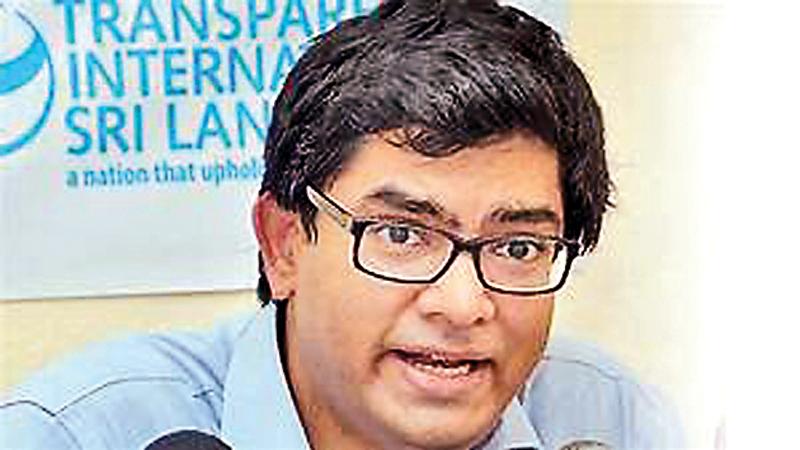
Corruption Perception Index (CPI) 2019 ranks Sri Lanka with a score of 38 keeping the country in the same position as last year, placing it far behind countries such as Bhutan with 68 points and India with 41 points in the South Asian region and placing it far behind the Asia Pacific regional level average of 45.
Speaking at the press conference held to release the CPI report, Executive Director of Transparency International Sri Lanka (TISL) Asoka Obeysekere said that the stagnation of the CPI score is validated by the numerous corruption cases which have seen limited progress.
“The CPI deals with perceived levels of public sector corruption. The causes for these challenges can range from skills gaps to deeply entrenched inefficiencies in the criminal justice system,” he said.
Chair of TISL, Delia Ferrerira Rubio said that governments must urgently address the corrupting role of big money in political party financing and the undue influence it exerts on political systems.
In its report TISL makes several recommendations if countries are to end corruption and to restore trust in politics.
The recommendations include countries adopt measures through managing conflicts of interests, controlling political financing, strengthening electoral integrity, regulating lobbying activities, tackling preferential treatment, empowering citizens and reinforcing checks and balances.
To manage conflicts of interests governments should reduce the risk of undue influence in policy making by tightening controls over financial and other interests of government officials.
“Governments should also address ‘revolving doors’, establish cooling-off periods for former officials and ensure rules are properly enforced and sanctioned”, the recommendations read.
 In relation to controlling political finance, another recommendation made in the report, TISL has persistently for some time been pushing to incorporate campaign financing laws with not much success. Politicians, which the country’s legislative body consists of, across the board have failed to take a proactive role or even assist with the laws, save for a very few.
In relation to controlling political finance, another recommendation made in the report, TISL has persistently for some time been pushing to incorporate campaign financing laws with not much success. Politicians, which the country’s legislative body consists of, across the board have failed to take a proactive role or even assist with the laws, save for a very few.
“Political parties should also disclose their sources of income, assets and loans, and governments should empower oversight agencies with stronger mandates and appropriate resources”.
To date, not more than a handful of politicians have made an asset declaration.
Strengthening electoral integrity is to ensure that elections are free and fair. This ensures that democracy is effectively used against corruption.
“Governments must ensure that elections are free and fair. Preventing and sanctioning vote-buying and misinformation campaigns are essential to rebuilding trust in government and ensuring that citizens can use their vote to punish corrupt politicians,” the report states.
Lobbying activities is another aspect where politicians can actively get involved in curbing. Campaign financing is a one-stop-shop solution to most of the recommendations in the report.
“Governments should protect civil liberties and political rights, including freedom of speech, expression and association. Governments should engage civil society and protect citizens, activists, whistle blowers and journalists in monitoring and exposing corruption,” another recommendation states.
This index shows the need for greater political integrity in many countries and how that alone is responsible for a major portion of corruption in the country.
“To have any chance of curbing corruption, governments must strengthen checks and balances, limit the influence of big money in politics and ensure broad input in political decision-making. Public policies and resources should not be determined by economic power or political influence, but by fair consultation and impartial budget allocation,” the report states.
The Nordic economies stand out as leaders on the CPI, with Denmark (87), Finland (86), Sweden (85), Norway (84) and Iceland (78) taking five of the top 11 places. However, integrity at home does not always translate into integrity abroad, and multiple scandals in 2019 demonstrated that transnational corruption is often facilitated, enabled and perpetuated by seemingly clean Nordic countries.
However, TlSL emphasizes that this is not to mean that these countries that are placed at the very top in the index are immune to corruption.
“Despite some high-profile fines and prosecutions, our research shows that enforcement of foreign bribery laws among OECD countries is shockingly low. The outsized roles that some companies play in their national economies gives them political support that too often triumphs over real accountability. Some banks and businesses aren’t just too big to fail – they’re also too powerful to pay. Anti-money laundering supervision and sanctions for breaches are often disjointed and ineffective. The CPI highlights where stronger anti-corruption efforts are needed across the globe. It emphasizes where businesses should show the greatest responsibility to promote integrity and accountability, and where governments must eliminate undue influence from private interests that can have a devastating impact on sustainable development.”
In compiling the report the index ranks 180 countries and territories by their perceived levels of public sector corruption, according to experts and business people. It uses a scale of zero to 100, where zero is highly corrupt and 100 is very clean. More than two-thirds of countries score below 50 on this year’s CPI, with an average score of 43. Similar to previous years, the data shows that despite some progress, a majority of countries are still failing to tackle public sector corruption effectively.
“In the last eight years, only 22 countries significantly improved their CPI scores, including Greece, Guyana and Estonia. In the same period, 21 countries significantly decreased their scores, including Canada, Australia and Nicaragua. In the remaining 137 countries, the levels of corruption show little to no change,” the report further states.
